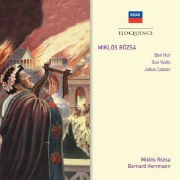- HOME
- SHOPPING
- Pre-Order (Upcoming)
- Pre-Order Imported
- Pre-Order Japanese
- New Releases
- New Imported
- New JPN Movie & TV
- New JPN Anime
- New JPN Game
- New Blu-ray/DVD/etc.
- Imported CDs
- Japanese Releases
- Japanese Movie & TV
- Foreign Movie & TV
- Anime
- Game
- Blu-ray/DVD/etc.
- Shopping Cart
- SPECIAL
- Feature Articles
- On Sale
- INFORMATION
- About Us
- Service Center
- News & Information
- Contact Us
- Mail News
- Japanese Site
- Close MENU
- HOME
- ROZSA: FILM MUSIC - Ben Hur, Julius Caesar, Quo Vadis (2CD)

Miklos Rozsa (1907-95) was one of Hollywood's greatest film score composers in the so-called golden age of the 1940s through the 1960s, before the studios stopped owning actors and independence came to the industry. Rozsa was also a classical composer of limited note whose works for solo instruments generated some following among classical musicians. His quasi-classic Spellbound concerto for piano from 1942 is well-known but, for most listeners and collectors, he is best known through his scores to classic films ranging from The Thief of Baghdad in 1940 through Dead Men Don't Wear Plaid in 1984, his final score.
In this package, Australian Eloquence has reinvented the London Phase 4 recordings of two major scores, Quo Vadis from 1951 and Ben-Hur from 1959, and thrown in three excerpts from Julius Caesar (1953.) With the exception of the latter, this is the same package that was marketed in USA by Dutton Labs -- Quo Vadis & Ben-Hur (2007) ASIN: B000KLNQ64.
In terms of performance and sound, there is little to choose from the two. Both contain the original scores conducted by the composer in the two main features. The Julius Caesar excerpts (the Ides of March, Caesar's ghost, and approch of Octavian's army and death of Brutus) are conducted by Bernard Herrmann and played by the National Philharmonic Orchestra. While well done and enjoyable, Herrmann's Rozsa sounds more like Herrmann than Rozsa to me. He focuses more on the darkness of the low brass and less on the strings and high brass that gave the composer's conducting such dash, brightness and vigor.
If you have never heard either the Quo Vadis or Ben Hur scores, they drift between romanticized ideas detailing Christ and the Romans -- most directly identifed in the prelude and Parade of the Charioteers from Ben Hur -- to the Mediterranean Assyrian dance from Quo Vadis that will remind a lot of classical music fans of Richard Strauss's dance of the 7 veils from his opera Salome.
Anyone that likes film music or scenic-romantic orchestral music is the audience for this fine collection. They don't quite give the complete flavor of the films they proejct like some other Rozsa collections, notably The Green Berets, but they capture the essence of the religios epics and are, with El Cid and King of Kings, among Rozsa's very best scores. The sound, which was always good from the time of the first recordings in 1974, 1976 and 1977, is transferred very well here. Raymond Tuttle's notes seem very familar, as if I've read them before in other offerings. Even if not, they are well-written and informative, enough to get any novice interested in the music and the composer.